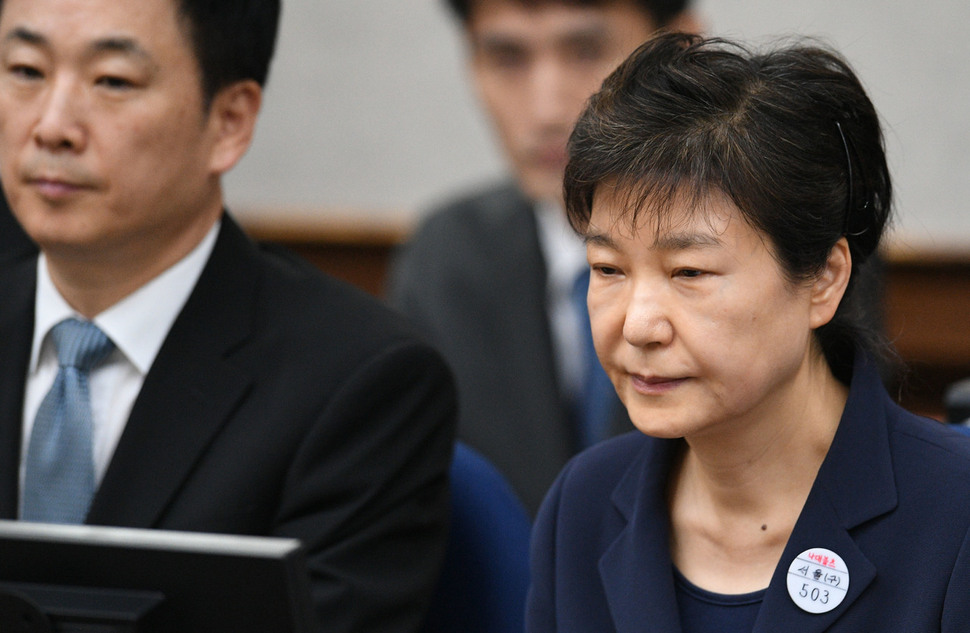Posted on : Nov.29,2017 16:26 KST
 |
|
Former President Park Geun-hye attends the first stage of her trial on corruption and bribery charges on May 23. (Photo Pool)
|
After former president Park Geun-hye failed to appear for two hearings in a row in her trial, which has now resumed, the court proceeded with her trial in absentia on Nov. 28. Park submitted documents to the court explaining that she could not attend the proceedings because of poor health on Nov. 28, just as she had done the previous day, but Hon. Kim Se-yun, presiding over the 22nd criminal division of the Seoul Central District Court, went ahead with the scheduled questioning of the witnesses.
“It is difficult to conclude that Park has legitimate reasons for not attending, such as a physical condition that would prevent her from moving around,” Kim said. Staff at the jail where Park is detained have said that she has back pain and swollen knees, but that her health condition should not prevent her from appearing at court, considering that she takes a 30-minute walk every day.
When the court issued another arrest warrant for Park in October, she declared she would not be part of the legal proceedings, which she described as “political retaliation under the guise of the rule of law,” and thus her refusal to attend the trial was preordained. However, even former presidents Chun Doo-hwan and Roh Tae-woo appeared in the courtroom after their legal teams resigned on similar grounds. Park’s refusal to attend the trial violates the most fundamental of the rules she ought to obey as a former president. After ignoring a search warrant and the court’s subpoena and delaying the trial, Park is now boycotting the trial itself – which can only be described as a vicious exploitation of the judiciary by someone who has already exploited the executive branch for her own ends.
Park has probably concluded that she cannot defend herself from the charges against her through the legal process. That conclusion was likely influenced by the fact that the charges of taking bribes that she is already facing have been recently compounded with the news that she appropriated the National Intelligence Service’s (NIS) special activity budget for her own private purposes. With two members of the “doorknob triumvirate” (former Blue House secretaries Lee Jae-man and Ahn Bong-geun), and former directors of the NIS providing concrete testimony of her appropriation of these funds, she probably thought she no longer had a way out.
This is what makes her political struggle behind bars, which is aimed at her political supporters, so calculating. She ought to know that this will only cause her to suffer an even greater legal punishment, since she is not only committing a greater crime against the public, but she is also provoking the indignation of the majority of South Koreans.
It’s extremely troubling that some reactionary conservative forces have started to obstruct the new administration’s efforts to clean up corruption, as if in lockstep with Park’s “political struggle.” Pro-Park political figures first advanced the argument that the fight against corruption represents “political retribution,” and now some of them are even refusing to cooperate with the prosecutors’ investigation. When Liberty Korea Party lawmaker Choi Kyoung-hwan was called in for questioning on charges of receiving 100 million won (US$92,000) of the NIS’ special activity budget while serving as Minister of Strategy and Finance, he initially refused to cooperate with what he called an “unjust investigation,” though he eventually changed his mind.
The investigation into political meddling by the military’s Cyber Command has hit a snag after the court overturned a warrant. Certain segments of the opposition and the press criticized the arrest of former defense minister Kim Kwan-jin, and 11 days later a court that reviewed the appropriateness of Kim’s arrest ordered his release. Considering that Kim’s subordinate Lee Tae-ha, former head of the psychological operations team, has already been found guilty in the initial trial and on appeal and that none of the circumstances have changed since Kim’s arrest, it is baffling that the court would release him on the grounds that “it is debatable whether a crime occurred.”
We can only hope that the courts have not been influenced by the narrative of “political retribution” advanced by the reactionary conservative press and opposition parties. This narrative obscures the essence of the matter and overlooks the severity of dragging the military into politics, which constitutes a criminal attack on the constitutional order. The NIS political manipulation scandal by itself is enough for former president Lee Myung-bak and his cronies to grovel before the public in penitence, but instead they are making a mockery of the public by resorting to the petty tactics of blackmail and insinuating that they have evidence about corruption by past governments, too.
We hope that the prosecutors will not be swayed by these political attacks and will leave no stone unturned in their inquiry into the charges pertaining to the Lee Myung-bak slush fund, considering that the statute of limitations will run out soon.
Please direct questions or comments to [english@hani.co.kr]






